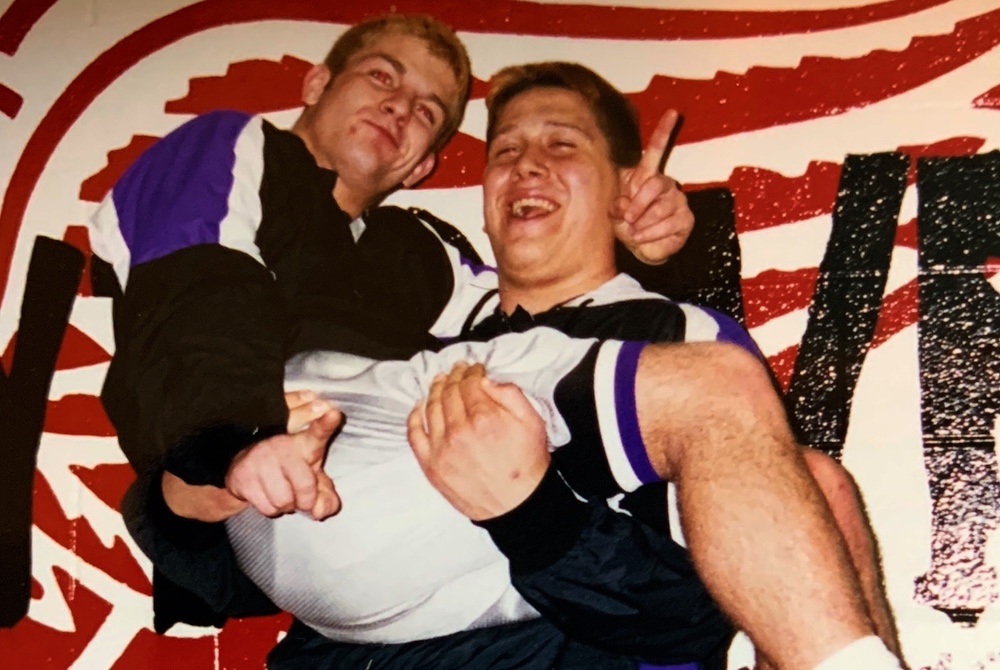
Caro Champs Find Common Ground Again as Mental Health Providers
By
Paul Costanzo
Special for MHSAA.com
July 8, 2021
Phil Millerov and Phil Niklowicz wanted to do more than simply defeat opponents when wrestling at Caro High School.
They wanted to dominate – physically and mentally.
 “We had this thing between us where we wanted to be done, and (opponents) didn’t want to come back on the mat with us,” Millerov said.
“We had this thing between us where we wanted to be done, and (opponents) didn’t want to come back on the mat with us,” Millerov said.
Twenty years later, both spend their days building people up. Millerov is a licensed professional counselor, while Niklowicz is a licensed therapist.
“I went out there looking to dominate and make sure it was known that I am the superior wrestler in all facets,” Niklowicz said. “I would try to run up as many points as fast as I can. I would teach the same thing when coaching, specifically with my nephew. You’re saying, ‘Listen, we want to break these people.’ Then the next day, in a therapy session, it’s like, ‘Let’s build up your self-esteem and set some goals to boost ourselves up.’”
The close friends and two faces of Caro’s surging wrestling program in the late 1990s now have very similar careers. Millerov – who finished second, third and first at 275 pounds in the 1998, 1999 and 2000 MHSAA Finals, respectively -- works in private practice at Transitions Counseling Service in Greenville, where he specializes in substance abuse disorders. He also has served as a Class 1 Fellow at the WK Kellogg Foundation.
Niklowicz – a two-time MHSAA Finals champion (1999 and 2000) and four-time placer – is working in private practice in Southfield, seeing mostly children. He also works in adult foster care with patients who have had traumatic brain injuries.
“He and I went and hiked Pictured Rocks at the beginning of May,” Millerov said. “And we joked about how nobody would have guessed that we’d be doing this now.”
That Millerov and Niklowicz are still close does not come as a surprise. Their friendship began when their wrestling careers did, as 6-year-olds in the Caro Growlers program. As they were becoming two of the state’s top wrestlers, they would share rides to tournaments, and their families grew close.
In high school, despite their size difference – Niklowicz wrestled at 135 his senior year – it wasn’t uncommon to see them warming up together.
“We were definitely easy going and liked to mess around a lot,” Niklowicz said. “We used to mess around before meets and throw each other. He would jump and I would throw him. People would look at us like, ‘Why is that little guy throwing that big guy?’”
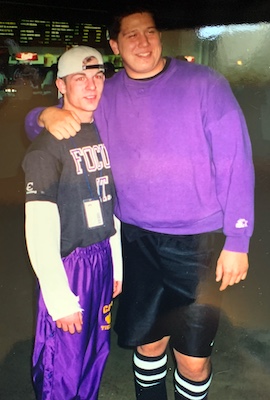 While their teams never made it out of the Regional, Millerov and Niklowicz helped set the stage for a program that would become among the best in Division 3 throughout the 2000s, qualifying for five straight Quarterfinals from 2003-07 and winning the Division 3 Finals title in 2003.
While their teams never made it out of the Regional, Millerov and Niklowicz helped set the stage for a program that would become among the best in Division 3 throughout the 2000s, qualifying for five straight Quarterfinals from 2003-07 and winning the Division 3 Finals title in 2003.
Individually, they were among the most well-known and feared wrestlers in the state.
“Niklowicz and I were fortunate to have each other, because we pushed each other,” Millerov said. “We were in constant competition with each other and ourselves. Just to kind of push each other, it was a great thing.”
Niklowicz finished fifth as a freshman and third as a sophomore before winning back-to-back titles to close out his career. In 1999, he defeated Nick Oertel of Goodrich 9-2 in the 125-pound final, and the next year he defeated Oertel’s teammate, Ryan Tripp, 7-5 at 135. Tripp would go on to win an individual title the following year. Niklowicz would finish his career with 214 victories.
“I think probably both (Finals titles) were equal,” Niklowicz said. “I think there was probably a little more stress going into my senior year. My motivation always came from improving, then it was maintaining the state title. You don’t want to go the opposite direction.”
Millerov lost a tight 6-4 decision against Remus Chippewa Hills’ Bob Kozlowski in the MHSAA Finals as a sophomore, and had an epic 12-10 match against future NFL defensive lineman Jason Babin of Paw Paw in the 1999 semifinals before fighting back to take third. The next year, he won his title via first-period pin against Dan Kliphuis, a two-time runner-up from Grand Rapids West Catholic. Millerov finished with 196 career wins and set the state record for pins in a career (160), which was broken the next season by Nick Simmons of Williamston and is now held by Justin Zeerip of Hesperia. The 56 pins Millerov recorded his senior season remains second all-time to Simmons, who had two seasons with 57.
“I never really thought about (the pin record) to be quite honest,” Millerov said. “It was just kind of in the background. It didn’t matter; all I cared about was winning this match, and I wanted to do it in the most effective, efficient way I could.”
They both continued their wrestling careers, but went their separate ways in college, with Millerov heading to Neosho County Community College in Kansas and Niklowicz to Virginia Tech.
Millerov had interest from several Division I schools coming out of high school, including some in the Big Ten, but he admits his grades weren’t good enough at the time. Neosho provided a chance to compete with some of the best in the country while at the junior college level, however, as the team took second at the National Junior College Athletic Association championships in 2002.
He transferred to Central Michigan after his sophomore year, joining his girlfriend – now his wife – who was already attending, and walking onto the wrestling team. While his relationship lasted, wrestling did not.
“I was distracted,” Millerov said. “My grandmother passed away in 2002 in that summer. I was trying to get that motivation back, and I just lost it. There has to be that edge with wrestling. When things didn’t work out, I struggled. Wrestling was my identity.”
Millerov was working to follow in his father’s footsteps and become a police officer. But the elder Phil Millerov, who died in 2012, talked his son out of it.
“Looking back on it, for me, it was obviously the right decision,” Millerov said.
The idea to go into counseling came after Millerov was married in 2006, as his wife had gotten into the program. He went back to school to earn his bachelor’s degree from CMU in 2007, and would go on to get his master’s from CMU, as well.
“I had taken a bunch of psychology courses just because I liked the field,” Millerov said. “I liked to be challenged. I liked puzzles, and with psychology, it’s like a new puzzle every hour. It just clicked. I flew through and graduated with like a 3.8. I was like, ‘Wow, I kind of feel smart.’ It was good to find something I was passionate about again.”
Millerov said he’s constantly learning and honing his craft, much like he did as a wrestler. A major difference now, however, is that he’s found more balance in his life.
“I think about working with athletes in addiction, I find a lot of similarities,” he said. “Wrestling was my life, it’s how I identified myself. I hear that same kind of talk around people struggling with addiction. One you’re considered successful for, the other you’re not. Most of my growth has been around finding balance. I find that my happiness and my clients’ as well, is when we found that balance instead of being good at just one thing. I want you to have passion, I want you to do things you love, but I also want you to be effective as a husband, a father, whatever other responsibilities you have.”
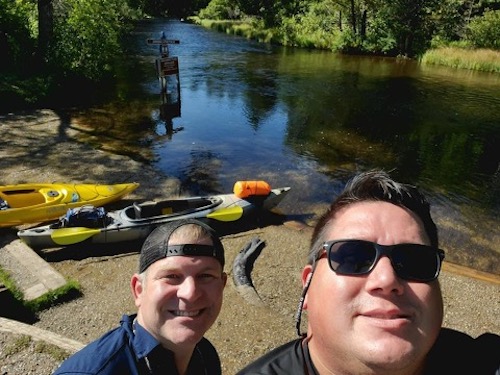 Niklowicz’s journey to becoming a therapist was more telegraphed, as both of his parents work in mental health, and he said it was always something he wanted to do, as well.
Niklowicz’s journey to becoming a therapist was more telegraphed, as both of his parents work in mental health, and he said it was always something he wanted to do, as well.
He attended Virginia Tech on a wrestling scholarship, but transferred to Eastern Michigan after one year. The Hokies had recruited him to wrestle at 133 pounds, but when the team’s 125-pounder was injured, Niklowicz was asked to cut down further. Like Millerov, he struggled when his wrestling career ended.
“I just had a really bad taste in my mouth after leaving Virginia Tech and trying to cut all this weight,” he said. “Some of it was I had lost the desire to work out, to wrestle. Fifteen years, roughly, of my life was dedicated to wrestling, and once you stop, what do I do with my winters? What do I do with seven months of the year? It was definitely a part of my identity; that’s why I got into coaching. I did MMA fighting for a little bit to have something competitive.”
Like Millerov, Niklowicz said finding balance was important.
“In the mental health field, specifically, there’s a lot of burnout for people,” he said. “Every day, you’re listening to people talking about their problems, but at the same time, they’re coming for a reason and they’re there for help, so you have to provide that help and have to motivate yourself to come to the office every day and give it your best. I try to instill the motivation that I used to other people.”
When Niklowicz looks at his time as an athlete compared to his work as a therapist, he said that work ethic is the main characteristic that has carried over.
“I think my practice mentality was the same as it was on the mat,” he said. “Even in the wrestling room, these are people I’m friends with, people I grew up with, and I still didn’t want anyone to score on me. Then you just look at your work ethic outside of wrestling, whether you’re studying for exams or motivating yourself to get up and go to class.”
While they are no longer living in the same town or living similar lives – Millerov is married with three kids, while Niklowicz is single – the connection between Caro’s dominant duo remains strong, both professionally and personally.
“I don’t think we ever thought we would be going down such a similar path, and I doubt that either one of us grew up thinking we would do the exact same thing,” Niklowicz said. “We met when we were 6 years old, and we’ve been best friends forever. I think it’s hilarious that we’ve taken such similar paths but with some glaring differences. It’s definitely interesting that we’re still really good friends after 30-some years, especially since we’ve moved on and gone our separate ways.”
2020-21 Made in Michigan
June 28: Michigan's Minor Leaguers Making Up for Lost Season - Read
PHOTOS: (Top) Caro’s Phil Millerov lifts teammate Phil Niklowicz as both celebrate Division 3 championships during the 2000 Individual Finals at Joe Louis Arena. (Middle) Niklowicz, left, and Millerov were high school warm-up partners despite wrestling at significantly different weights. (Below) Niklowicz and Millerov take a selfie during a hiking trip to Pictured Rocks National Lakeshore in May. (Photos courtesy of Niklowicz and Millerov.)
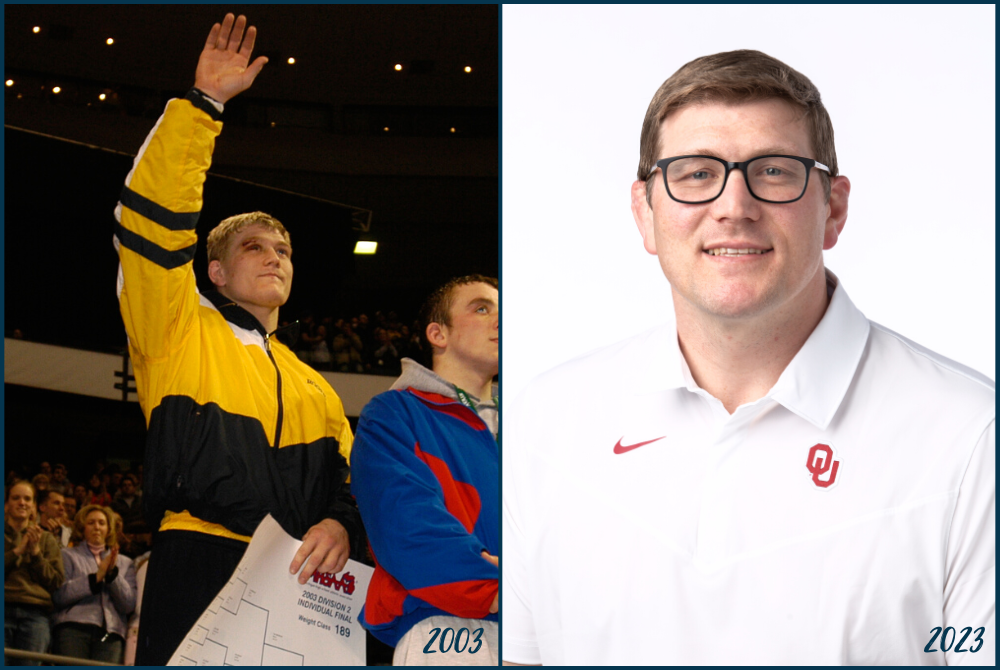
Lapeer West 4-Time Finals Winner Set to Build Champions at Oklahoma
By
Paul Costanzo
Special for MHSAA.com
July 5, 2023
Roger Kish has a habit of accomplishing great things in a short amount of time.
 He won an MHSAA Individual Wrestling Finals title as a freshman at Lapeer West, his first of four.
He won an MHSAA Individual Wrestling Finals title as a freshman at Lapeer West, his first of four.
He was an NCAA finalist as a sophomore at Minnesota.
He was a Division I head wrestling coach at North Dakota State University at 27.
So, it should come as little surprise that before hitting his 40th birthday, Kish is now in charge of one of the nation’s most storied college wrestling programs.
Kish, 39, was recently named the head coach at Oklahoma, a program that has won seven national titles and produced 67 individual champions in its history.
“It’s something I’m very grateful for, and I’m certainly humbled to walk the same halls of some of the Oklahoma greats,” the 2003 Lapeer West graduate said. “Being able to lead this program is nothing short of a dream come true. The administration is great, and in terms of the support system that’s in place, what they have at Oklahoma is second to none.”
Kish takes over a Sooners program fighting to get back into the conversation as one of the nation’s best. His time at NDSU portends well for that, as he had the Bison as high as No. 12 in the country a year ago, the highest ranking in program history.
NDSU also defeated Oklahoma in a Big 12 dual meet, and finished 24th at the NCAAs, with a program record 25.5 points.
“Roger knows what it takes to build a championship-caliber program, and he’s done just that at North Dakota State, with many of his wrestlers having won conference titles and earning All-American honors,” Oklahoma Director of Athletics Joe Castiglione said in a release. “His coaching philosophy aligns with our approach at Oklahoma, and I know he’ll guide our wrestling program toward achieving the standards we’ve set for ourselves.”
Had you told a teenage Kish this would be his future as he was racking up the second-most wrestling victories in state history, he wouldn’t have believed it. Not because it was too ambitious, but because coaching wasn’t even on his radar.
In fact, it wasn’t something he was considering even as he was becoming a two-time All-American at Minnesota.
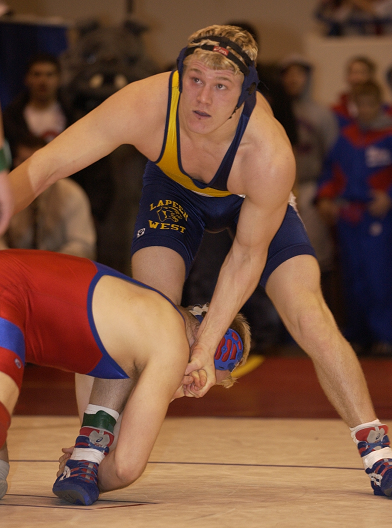 “I would be lying to say that I wanted to be a high school or college wrestling coach, career-wise,” Kish said. “I had other plans.”
“I would be lying to say that I wanted to be a high school or college wrestling coach, career-wise,” Kish said. “I had other plans.”
Those other plans were to either continue wrestling beyond college, explore a career in mixed martial arts, or become a chiropractor.
It was all on the table for him as his collegiate career came to a close, but an injury and the long recovery process that followed opened up a new avenue for Kish.
“When I had my surgery, I was off the mats for a lot of time, but I was still able to be on the mats, not as a competitor, but in a way that I could help some of my younger teammates,” he said. “I wanted to be able to give back to those guys that had helped me. That’s where it all began.”
He had been accepted into the chiropractic program at Northwestern Health Sciences University in Bloomington, Minn. But he chose to put that off to continue his recovery for a possible mat return, and to serve as a graduate assistant for the Gophers.
The following year, he was asked to join Bucky Maughan’s coaching staff at North Dakota State, and his career as a coach took off.
“Throughout that year (at Minnesota), I really enjoyed helping out those young guys,” Kish said. “I took an opportunity from Bucky Maughan, because he needed a bigger guy to train with those bigger guys. It seemed like the best route in the moment, so I took it and never looked back. I was an assistant for two seasons, and built really good relationships with stakeholders in the athletic department. Following two seasons under Bucky Maughan, he retired after 46 seasons, and the position opened up. They did a national search, and I think the relationships I had built with stakeholders, and the immediate success of the program in the two seasons I was part of it, led to a great opportunity for me to take over at North Dakota State.”
Kish built a strong program in his 12 seasons at the helm, compiling a 108-70 record. During his time, the Bison moved from the Western Wrestling Conference to the Big 12 and didn’t skip a beat. NDSU is 33-26 in its time in the Big 12, including a 6-2 mark this past season, which was good enough for fourth place during the regular season.
NDSU has sent 21 wrestlers to the NCAA Championships over the past four seasons, with nine becoming All-Americans.
While it’s now in the corner and not in the center of the mat, Kish and wrestling success have long been synonymous.
Kish was 117-27 at Minnesota, placing second in the nation as a sophomore and third as a junior. He also won a Big Ten title at 184 pounds as a sophomore.
He was 252-2 in his high school career, with both losses coming during his freshman season. The 252 wins are second in MHSAA history only to 260 won by Justin Zeerip of Hesperia. Kish was unbeaten in his last 223 matches, placing him third all-time for consecutive wins behind Zeerip and Brent Metcalf of Davison (228).
In 2003, Kish became the 11th wrestler in MHSAA history to win four individual titles. At the time, nobody had won them at higher weights, as Kish won at 160, 171, 189 and 189.
“For me, it probably didn’t feel as big in the moment as it probably did for other people,” Kish said. “For me, it was the expectation to win it as a freshman. My own father said, ‘I don’t know if he’s going to get out of the Regional.’ I took it very personal and serious. But I didn’t think of how hard it was to do in the moment. I’m in awe of how talented these (more recent four-timers) are. Doing it today is seemingly a lot more challenging.”
Wrestling has long been a family experience for Kish, as his father, Roger Kish Sr., coached alongside Hall of Famer John Virnich at Lapeer West.
Kish’s older brother James was a two-time Finals champion who wrestled at North Carolina and amassed 215 career high school victories.
“I was fortunate enough to have a father who gave a tremendous amount of care to the sport and was always trying to keep my brother and I busy throughout our youth,” Kish said. “He always had us in some sort of activity. It probably also stemmed from having an older brother that was a couple years older than myself. I was always a little bit bigger, and he was a little more agile. We were always competitors – call it a brother thing. That allowed each of us to excel in sports, having one another to compete with.”
Kish also played football at Lapeer West and was a starting varsity linebacker as a freshman.
“Wrestling was my passion,” Kish said. “I loved playing football, but it was what I did to take a break from wrestling. It allowed some different facets to cultivate in terms of building relationships and recognizing different factors that helped motivate individuals. … Understanding being on a team, and relying on and trusting other people to help you succeed, whether that’s your teammates or your coaches.”
As someone who made the most of his time in high school athletics, and now remains close to them in a recruiting aspect, Kish is fully aware of how important they are for students.
“Having an outlet for young kids to be active and learn the traits that will help them later in life – the discipline and the humility of wins and losses, the work ethic that’s necessary, understanding what goals are and how to achieve those goals, dreaming a little bigger than what’s realistic – is good for kids,” Kish said. “Athletics is a great platform to do that. Wrestling is a great platform to do that. To help them grow as young men and women, that’s extremely important.”
Made in Michigan is powered by Michigan Army National Guard.
PHOTOS (Top) Roger Kish stands atop the MHSAA champions podium in 2003, and was hired as Oklahoma’s head coach in May. (Middle) Kish helps Lapeer West to the Division 2 team runner-up finish with this match against Mason as a senior. (Lapeer West photos from MHSAA archives; Oklahoma photo courtesy of University of Oklahoma athletic department.)

